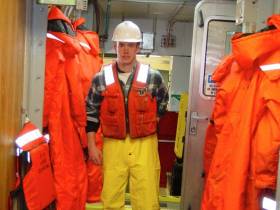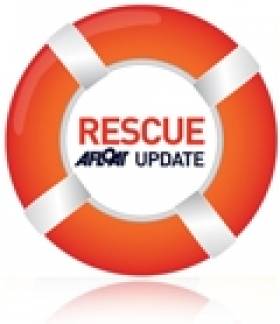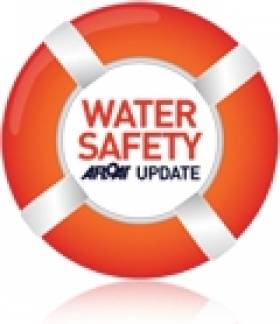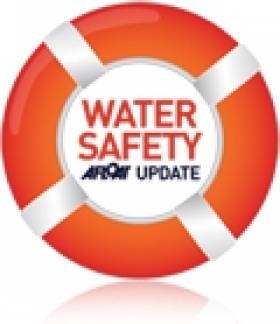Displaying items by tag: PFDs
#WaterSafety - The latest Marine Notice from the Department of Transport, Tourism and Sport (DTTAS) advises everyone on or near the water of the correct use of lifejackets or personal flotation devices (PFDs).
Lifejackets should always be warn over all clothing, so that there is sufficient space for the device to inflate, the wearer’s breathing is not restricted, and there is easy access to activate a manual personal locator beacon.
Marine Notice No 34 of 2017 comes after the recent MCIB report into the death of lobsterman Patsy Kelly in Galway Bay last September, as previously reported on Afloat.ie.
Kelly, who went overboard from his vessel while retrieving a string of lobster pots, was found to be wearing a PFD but underneath an oilskin smock, significantly limiting his ability to signal for help.
The report also found that Kelly’s lifejacket was five months overdue for service of its active components, such as its gas canister and battery-operated light.
CH Marine Stage 'Lifejacket Awareness Week'
#lifejacketawareness – Inflatable Lifejackets are without doubt the most convenient and unobtrusive PFDs available but they do need regular checks and servicing for their safe operation when needs. Leading Lifejacket supplier CH Marine is holding a Life Jacket Awareness Week this week and offering information and guidance on the safe use and care of Gas Inflation Lifejackets. The RNLI are attending and, as well as daily tips ,special offers there are also chances to win some great lifejackets. Check out CH Marine Facebook Page for more.
Marine Notice: Care And Use Of EPIRBs And Lifejackets
#MarineNotice - The latest Marine Notices from the Department of Transport, Tourism and Sport (DTTAS) remind all mariners of the importance of safety at sea - both in seeking help and staying safe till help arrives.
Marine Notice No 38 of 2013 details guidelines for the care and maintenance of Emergency Position Indicating Radio Beacons or EPIRBs, which if installed correctly will automatically operate if a vessel capsizes, notifying the nearest emergency services of your location.
Meanwhile, Marine Notice No 39 of 2013 informs all owners, charterers, masters, skippers and crew of fishing and commercial vessels that correctly selected and worn lifejackets or personal flotation devices (PFDs) save lives.
Marine Notice on Legal Requirements for Personal Flotation Devices
#WATER SAFETY - The latest Marine Notice from the Department of Transport, Tourism and Sport (DTTAS) addresses the legal requirements for all recreational craft owners, masters and users in relation to the wearing and carrying of personal flotation devices (PFDs).
The notice discusses the different types of PFDs - lifejackets and buoyancy aids - and their performance standards, as well as highlighting the importance of their use, proper care and servicing for safe activities on the water.
The law makes clear that there must be suitable PFDs for everyone on board any pleasure craft, and that PFDs must be worn by anyone the deck of any craft or on board any open craft that is under seven metres in lengh - or for people under the age of 16, any craft regardless of length.
Also detailed are recommendations for the storage of PFDs, and guidance for their correct usage.
The use of lifejackets and buoyancy aids is particularly important in light of the recent Marine Casualty Investigation Board (MCIB) recommendations on a number of incidents where their availability could have saved lives.
Full details are included in Marine Notice No 45 of 2012, a PDF of which is available to read or download HERE.
#MCIB - The families of two fishermen found dead at sea off the Skerries last April may never uncover the circumstances that led to their demise. But the official report into the incident indicated that the absence of lifejackets was a significant contributing factor.
Ronan Browne (26) and David Gilsenan (41) were reported missing on the evening of 1 April after failing to return from a trip tending to lobster pots.
Their vessel, Lady Linda, was found the following morning upturned in an oil slick off Clogherhead with no sign of the crew.
It wasn't until a week later that their bodies were discovered caught in the vessel's fishing gear some five miles east of Clogherhead, as previously reported on Afloat.ie.
Post-mortem results found that both men died from drowning, with Gilsenan also showing signs of hypothermia.
With no eyewitnesses to the incident, the report by the Marine Casualty Investigation Board (MCIB) indicated a number of possible causes from eqiupment malfunction or shifting of lobster pots on deck, to the wave height and weather conditions on the day, which were reportedly deteriorating when the boat left port.
It also said that Browne and Gilsenan "were lifelong friends, both men were experienced and qualified marine engineers in the fishing vessel industry. Both men were experienced in boat handling and fishing and had worked together on many occasions."
But the report emphasised the lack of personal flotation devices (PFDs) on board, and noted that emergency equipment was stored under the deck and not easily accessible.
The MCIB's recommendations include a review of the code of practice for fishing vessels under 15m to establish "revised stability critera" and ensuring that all boats are fitted with automatic radio beacons that deploy upon capsize.
In a separate incident, lack of proper maintenance led to an unlicenced boat taking on water off Co Kerry last August.
The Claire Buoyant was carrying one crew, five passengers and 21 sheep from Beginish Island to Ventry when the vessel began to lose stability.
Skipper Eoin Firtear - who the MCIB described as having "limited sea-going experience" - and his five passengers were rescued by passenger ferry. All sheep were jettisoned overboard, with 18 eventually recovered.
The report reminded that the carriage of livestock should only be undertaken in appropriately certified vessels.
- MCIB
- Marine Casualty Investigation Board
- report
- Lady Linda
- Clogherhead
- Ronan Browne
- David Gilsenan
- lobster pots
- Fishing
- drowning
- hypothermia
- missing
- malfunction
- wave height
- Weather
- lifejackets
- Personal Flotation Devices
- PFDs
- Code of Practice
- stability
- Radio
- beacon
- maintenance
- unlicenced
- Co Kerry
- Claire Buoyant
- Sheep
- Passengers
- Beginish Island
- Ventry
- Eoin Firtear
- Skipper
- Rescue
- Livestock




























































